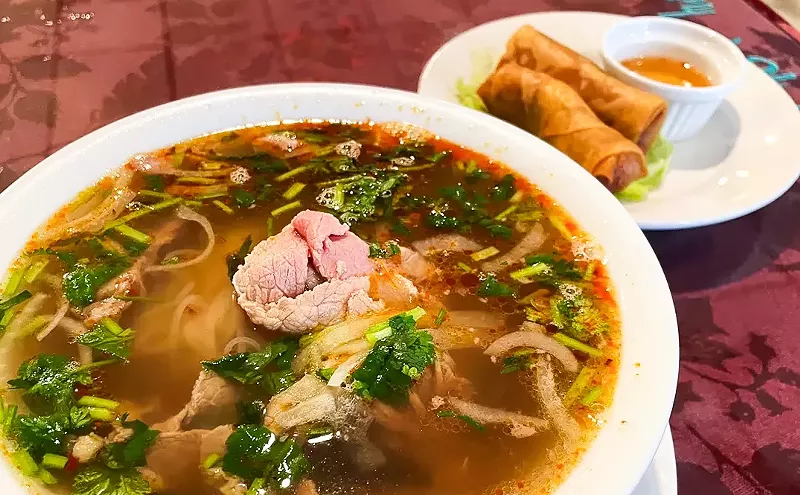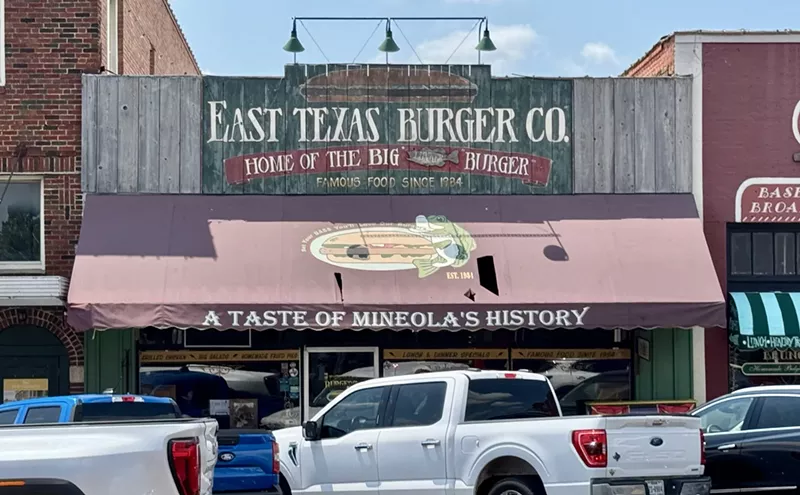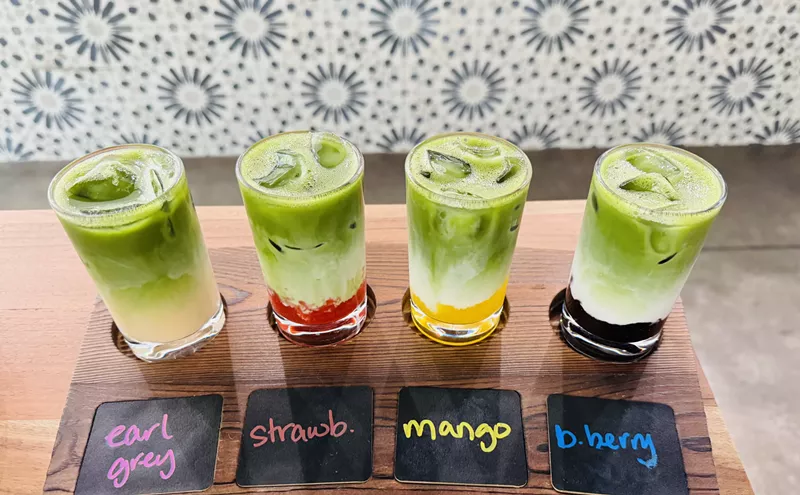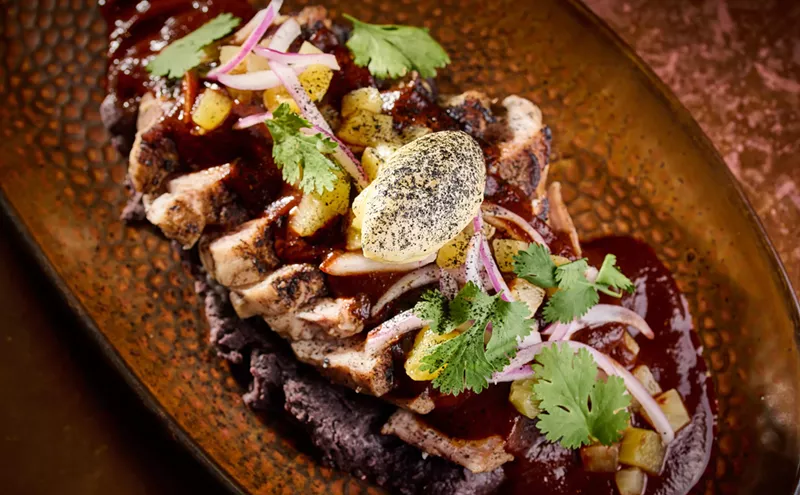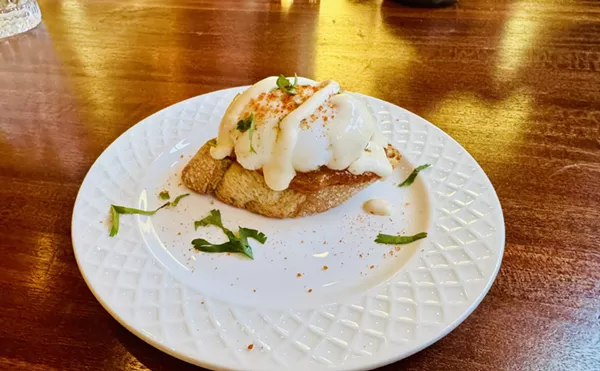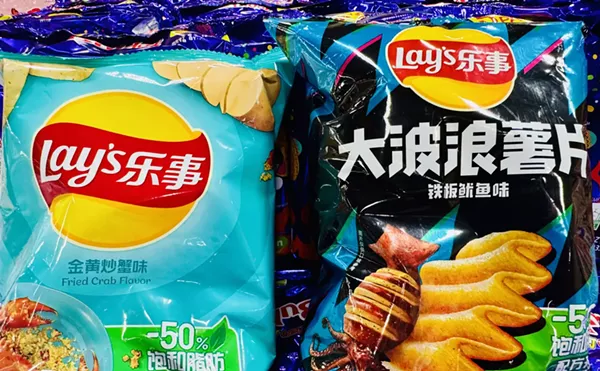"I'm a doctor," a stately gentleman with a thick accent says, "and he's an ER doctor," he says, pointing to the man sitting next to him. The ER doctor reaches out to shake my hand, and two courses in, I can see a faint pinkness in the whites of his eyes. "Nice to meet you," he says. "Do you have any Cheetos?"
Throughout our brief conversation, the doctor repeats his Cheetos joke two more times, each quip eliciting more laughs than the last. That's how it goes when you're stoned, and the 20 diners gathered for a four-course meal in a quiet Dallas neighborhood are indeed quite stoned, despite the fact that nary a joint or bowl has been lit. These friendly, put-together folks are not exactly the sort I was expecting to run into at an underground cannabis dinner, but then again, given the frightening state of Texas marijuana law, I never expected to be at an underground cannabis dinner in Dallas in the first place.
Sous vide Kobe sashimi with beet puree and a salad spritzed with a tincture made of Everclear and a strain of cannabis called White Widow; lobster pho with green tea noodles and a bold, fragrant broth cooked with marijuana resin; a brownie drizzled in pungently herbaceous caramel made with another variety of marijuana called AK-47. According to the chef, after all four courses, each diner will consume an estimated 7 milligrams of THC. In comparison, a smoker indulging in an average-sized joint will take in approximately 17 milligrams to 21 milligrams of THC.
The diners range in age from late 20s to late 60s, a mixed bag that runs the gamut from a young couple on a date to a group of 20-somethings sipping beer to a middle-aged married couple and the giggly table of 60-somethings. The room doesn't smell like weed; no one is smoking anything or staring blankly off into space in a cannabis haze. The servers are attentive and well trained, their experience in fine dining readily apparent. Had strangers happened upon this gathering, they would have had no idea, until hearing the chef speak between courses, that this quiet dinner party is feasting on course after course of marijuana-infused food.
It is an exceedingly normal, relaxed pop-up dinner — one that just happens to provide an illegal substance that, if he were caught serving it, could send the chef to prison for the rest of his life.
***
In the first three courses, there is no noticeable cannabis flavor; it isn't until dessert, a brownie drizzled in cannabis caramel, that the taste of marijuana entered the meal, and the rich, sweet caramel is deliciously bright and herbal, nothing like the bitter weed brownies once considered the benchmark for edibles. Potency, the kind and amount of food it's delivered in and how the THC is extracted all determine how long it takes to feel the effects of eaten cannabis, according to The Cannabist, the Denver Post's marijuana blog. After just one course — the opening Kobe beef and salad, both spritzed with a THC tincture — I'm characteristically warm and relaxed, my eyeballs feeling almost like they're floating in my skull. When I look in the mirror halfway through dinner, I look like a classic TV sitcom stoner: with red, squinty, watery eyes like those I soon spot all around the room, including on the older woman sitting across from me. She tells stories of weed-infused vacations and parties where she exposed curious friends to cannabis for the first time.

The first course of the evening, a beet puree with a tincture-kissed farmer's market salad and sous vide Kobe beef seared with the tincture sprayed on top.
Beth Rankin
For these sweet couples, a cannabis dinner differs little from a wine pairing dinner; it's just another excuse to get together, sample gourmet food and meet new people.
And that sense of normality, says chef David Anthony Temple, is why he decided to host a fine dining cannabis pop-up in a state that has some of the harshest marijuana laws in the country.
"Marijuana has been used in food for a long time," Temple says. "It's not something that I or anybody else invented."
Temple, who helped lead the underground dinner movement in Dallas after hosting his first pop-up in 2009, is a regular user of marijuana, both recreationally and, though it's not legal for this purpose in Texas, medically. He's prescribed medication like Xanax, he says, and he'd rather not be.
"I have severe anxiety, and this takes my anxiety away," he says. "I don't take [anxiety medication] if I can smoke."
When Temple, known around town as Chef DAT, decided to host a cannabis dinner, he chose to treat it exactly like the dozens of underground dinners he's hosted in the past. On Thursday, two days before the dinner, he sent an email to the 6,500-person list he's always used to announce his dinners."I just went in with that normal mentality. I just wanted people to be chill about it."
tweet this
"This is a very special and niche Saturday night," he wrote, noting that the dinner's theme was "Colorado edibles." Interested diners could email him back to reserve seats at the dinner, which, like most every underground dinner, had a suggested donation ($85, in this case) rather than a determined price. As he did for his other dinners, he sent out an email the day-of announcing the location. The only differences in this email were a request for diners to use Uber or Lyft, a rule against social media posts during the dinner (though photos were allowed) and a note that "THC will be in every course; please alert me if this is not up your alley." Only one person begrudgingly opts not to consume THC because of work-related drug testing, so Temple cooks him a THC-free meal "just like when somebody is gluten free," he says. When diners arrive at the start of the night, the only subtle hint of what was to come is the Sublime and Bob Marley playing quietly in the background.
"I just went in with that normal mentality. I just wanted people to be chill about it," Temple says.
Underground cannabis dinners aren't a new phenomenon. They've been happening across the country in states where recreational cannabis is legal, but they've been held, too, in states where marijuana is still very much illegal. In New York City, where it's still illegal, the company Sinsemil.la, which bills itself as "the first marijuana experience dedicated to fine dining," hosts meals that serve dishes like pasture-raised pork schnitzel with "overwintered vegetables and Og Kush butter." The "canna-chef" movement is growing substantially in markets like Denver, where recreational marijuana is legal. Chefs are launching lines of edibles and hosting dinners that pair specific strains with food, much like beer or wine pairings. In states where marijuana is still illegal, diners often report secretive, invite-only dinners held in out-of-the-way locations.
But Temple's dinner isn't a secret. In fact, it's open to the public. Anyone who got wind of the dinner and wanted to come could have made a reservation. He capped the dinner at 20 people and had a wait list, he says.
"I had a lot of phone calls," after announcing the dinner, he says. "'Dude, are you sure you’re doing this? You know you can get totally arrested for this, right?'"
But Temple, who in a few days is packing up and moving to Belize, says he was determined.
"I'm thinking of opening more minds and just getting it out there. I just think it should be totally normal," he says. "In the future, we’re gonna see things like Farmer Barry’s new strain of weed come out and everyone will rush to it like beer, like barrel-aged Lakewood Temptress. You're gonna see it in restaurants. It's the future. Weed service at the restaurant — why not?"
It may be part of America's culinary future, but in Texas, there's a big reason why it's not typically part of our present: prison.
***
Fort Worth attorney David Sloane calls himself "the marijuana defender of North Central Texas," and it's an apt title.
"I do a lot of interdiction cases and foods, extracts, the gummy bears and all that," he says.
Along with representing a large number of clients charged with marijuana-related offenses, Sloane is also an attorney for the National Organization for the Reform of Marijuana Laws and is actively involved in marijuana legalization efforts."He could get himself in serious trouble there. There’s no doubt about it."
tweet this
When Sloane learned about Temple's dinner, he expressed some sadness about missing it. "I'd definitely want to catch one of these dinners," he says. "But I'm a little worried for the guy.
"He could get himself in serious trouble there," he says. "There’s no doubt about it."
Texas marijuana laws treat the marijuana plant itself very differently than it treats concentrates, which include anything from hash oil to marijuana wax and even weed butter. Possession of less than 2 ounces of marijuana itself is a misdemeanor that could result in 180 days in jail and a $2,000 fine.
But take that same weed and cook it into a butter, infuse it into oil or make a tincture, and suddenly it's classified as a concentrate, which is an automatic felony, even for amounts of less than 1 gram.
"Anytime a solvent is used to extract the THC from the plant, it goes instant felony," Sloane says. "The THC is treated the same as PCP in terms of the severity."

Temple's dessert course, a brownie topped with crunchy almond twill and a gooey, herbaceous caramel infused with weed. Since the THC was extracted from the marijuana flower and imparted into the caramel, Texas law considers the substance a concentrate, which carries far stiffer penalties than marijuana itself.
Beth Rankin
"This is where you get the horror stories; you hear about the college student with the weed brownie facing a lifetime in prison," Sloane says.
A vape pen filled with THC oil, a bag of weed gummies purchased legally in Colorado and brought illegally to Texas, a batch of weed brownies with even the slightest amount of THC inside — the consequences for possessing any THC carrier other than the marijuana plant itself yields far harsher consequences under Texas law, Sloane says."This is where you get the horror stories; you hear about the college student with the weed brownie facing a lifetime in prison."
tweet this
Using tincture, oil and resin, Temple cooked the entire meal using concentrates. If police had caught wind of the dinner and raided the event, rather than measuring the milligrams of THC in the food, they would have weighed all the food in that restaurant, and classified it as THC concentrate. In the case of Temple's dinner, the pot of resin-infused lobster pho alone would have been enough to possibly send him to prison for the rest of his life.
"The thing that worries me for his poor soul, if he takes that 7 milligrams of THC and puts it into 5 pounds of flour and sugar and whatever to make a brownie, he’s just turned 7 milligrams of THC into 5 pounds of THC," Sloane says. "And anytime you get over 400 grams of THC or anything containing THC, you’re talking about an aggravated felony, and a sentence sometimes between five and 99 years."
Had Temple skipped the concentrates and instead sprinkled the dishes with keef — a fine powder that can be collected from the leaves and buds of the marijuana plant — he would have been in better shape if the cops had crashed the dinner. "I would be able to defend him a whole lot easier," Sloane says.
Dude, Sweet Chocolate owner Katherine Clapner once hosted a private marijuana dinner for her friends, held at a private residence, and would like to enter the edibles market, even though she doesn't consume marijuana herself. But right now, she won't touch pot in the state of Texas.
"It’s not time yet," she says. "I won’t do anything publicly because I wanna be ready to do it legally when it’s time. Until then, I’ll work with people outside of the state, which is something we’ll be working on this summer." That means that states where cannabis is legal could soon see THC-infused Dude, Sweet Chocolate truffles. But you won't see those products in Texas soon.
And Texas isn't likely to back off on its harsh concentrates penalties soon either, Sloane says.
"Right now we’re just trying to get 'em to lighten up on marijuana itself," he says. While he is working on bills to decriminalize marijuana, there's not even discussion about trying to tackle the concentrates issue. "We're just not there yet," he says.

The chicken with green curry was made with cannabis and also included hemp seeds, which do not contain THC.
Beth Rankin
"I would still have done the dinner but maybe in a different way," he says. "I think I still would have taken the risk."
Temple is more than willing to be a public face for the normalization of marijuana. Back in 2014, after recreational marijuana had become legal in Colorado, Temple was profiled in a Dallas Morning News story about Texans participating in "canna-tourism," traveling to Colorado to indulge legally. After the story broke, Temple says, some of his high-end clients, people who attended his underground dinners or hired him for private parties, stopped calling.
"I think I lost some business," he says. "I had some clients that stopped coming, but I also got some new clients that were super cool."
No matter the risks, Temple wants to advocate for marijuana reform. Plus, he says, "I just don't give a fuck."
Pro-marijuana lawyers like Sloane hope that one day Temple will be able to live out his dream of specializing in cannabis fine dining — or even just host a private dinner party at home without fear of losing everything.
"Isn't it a shame," Sloane says, "that you can't have a special dinner with your friends without facing life in prison?"




